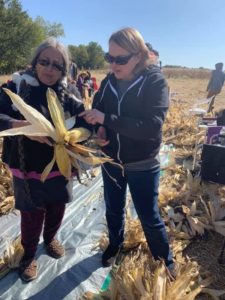By Nick Mayrand, CRUX

Ronnie O’Brien, a Catholic from Nebraska, has spent the past seventeen years working with Deb Echo-Hawk, Keeper of the Seeds for the Pawnee Nation in Oklahoma, on a project close to the heart of both women: Bringing back the Pawnee’s sacred ancestral corn from the brink of extinction.
Their Pawnee Seed Preservation Project has grown through patient, hard work and, they both say, some timely assistance from Saint Kateri Tekakwitha.
When their project began in 2003, the Pawnee tribe’s supply of Eagle Corn had dwindled to just fifty seeds resting in a single mason jar. The corn had been central to Pawnee culture and spirituality for hundreds of years, but it had not grown well in Oklahoma where Echo-Hawk’s ancestors had been forcibly resettled from their homelands in Nebraska in the 1870s.
Echo-Hawk, much like the vast majority of her tribe, is not Catholic, but each week for two years in the build-up to Kateri’s 2012 canonization, the Pawnee’s Keeper of the Seeds said a rosary and a set of Kateri prayers in hopes that the Catholic Church would recognize Kateri’s holiness.
Since then, Echo-Hawk has no doubt that the saint known as the “Lily of the Mohawk” has communicated with her and protected her tribe’s seeds. “I have three rain stories for Kateri,” she explained, “where I prayed and asked for help, sought her out, and then everything happened, she helped me out.”
In each of the three cases, Echo-Hawk believes that Kateri held off the rains just long enough, including one instance where torrential rainfalls were on the verge of ruining seven years’ worth of corn seeds. A statue of Kateri now sits in the Pawnee tribe’s main garden in Oklahoma, serving as a sign, she says, that even her tribe’s non-Catholic Nasharo Council of Chiefs believe her accounts.
“I love Kateri, who went through so much, whose faith was so strong that it carried her through difficult times,” said Echo-Hawk. “I think she’s a gentle reminder of a people who have been invisible, and yet have so much to offer.”
An identical Kateri statue also rests in O’Brien’s personal garden back in Nebraska. O’Brien says that Kateri has been a consistent guide for her in her work with the Pawnee, and she also credits Kateri with leading her to the St. Kateri Conservation Center, an organization devoted to inspiring and equipping Catholics to participate in local responses to ecological challenges.
O’Brien now serves as the Center’s Coordinator for Indigenous Programs, a new role she believes will allow her to draw on her experiences with the Pawnee to support similar preservation movements for other tribes, pulling in more Catholics along the way in the spirit of Laudato si’.
“Pope Francis really gets it in Laudato si’,” she said. “He is saying we Catholics must work with the Indigenous, and not just the Catholic Indigenous, and there’s now a movement within the Church to try to make that happen.”
“And when it comes to their relationship to the earth, the Indigenous are so far ahead of us,” she added. “They really need to be leading our response to ecological problems and we need to be listening to them.”
